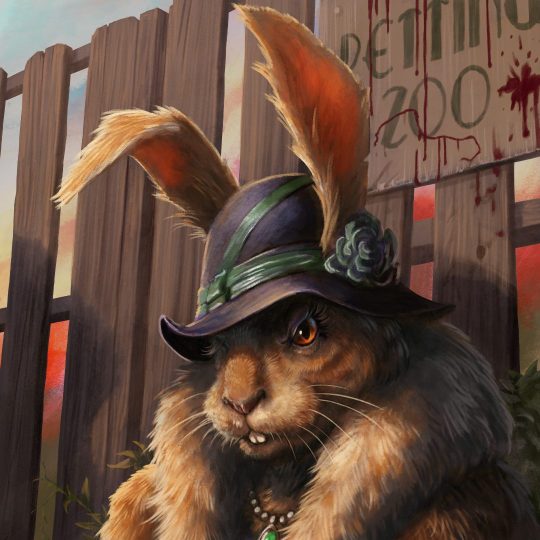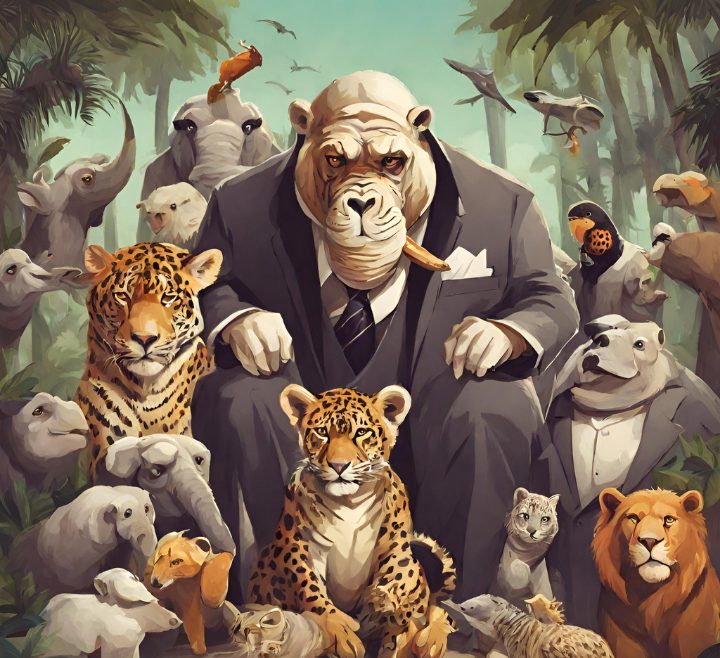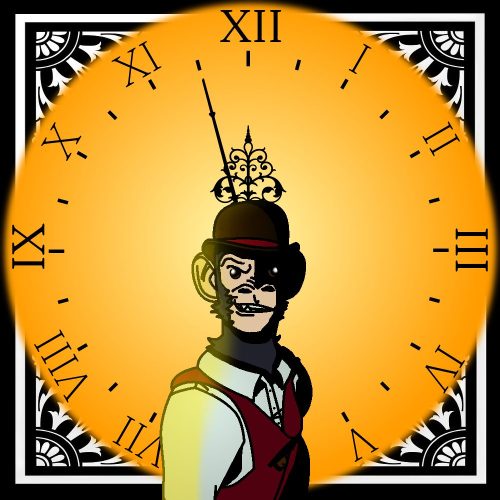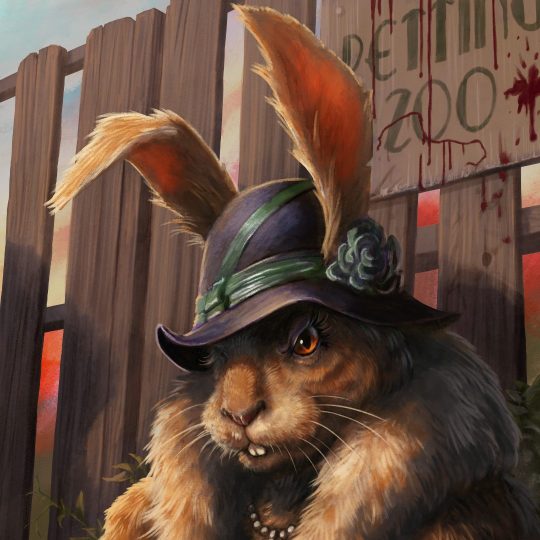
Monocle Society’s Kyle Kinkade talks Weave — Goblins Are Jerks and More
I’m hooked on Monocle Society’s Weave. A few weeks ago I started really looking into this innovative “half tarot, half roleplay, all story” game, reading up and watching/listening to some streamed games. And if you want to know why I’m so stoked about Weave, I’ve got you covered. I’ve since played several games and yowza! I also spoke with Kyle Kinkade about the amazing game he and his team put together. Let’s get into that and share what I learned about Weave from the man himself, including some details on the new Weave playset Goblins Are Jerks.
Talking about Weave with Kyle Kinkade
Kyle Kinkade is no stranger to game design and development. Since 2002, he’s been creating games and working in the industry with Microcoft Studios, Tapulous and currently Monocle Society, the company he started in 2012. From here, the critically acclaimed Weave storytelling platform emerged. Making a public debut at PAX Unplugged 2017, the game has since been featured prominently on Geek & Sundry and Penny Arcade.
Closer to home, Weave is currently at the top of my list of awesome games to play a lot more of, and it was a great pleasure to speak with Kyle on how the game came about, where it is right now and what Monocle Society plans for the future.
*This interview has been edited and condensed
“Weave was the first stop for us to build out a fully-fledged company dedicated to mixed reality and app-enable games. And when I say mixed reality, I don’t mean scan a card, right? I’m talking about doing some real mixed reality stuff.” – Kyle Kinkade
Nerditor Doug
From what I see, Weave is breaking new ground, melding technology in a smooth seamless way. You could whip out your cards and phone anywhere and start playing right away. And everything is kept organized for continuation later. It’s very innovative, and I haven’t seen anything like this before. How did Weave come about?
Kyle
Thank you. Late November of 2016 is when we said okay, we want to do something. We had an app to go with the first game [Dozen’s Donuts] because we always wanted to do app-enable games. The original idea was — and this is where I stumbled on the core of what Weave would become and also what Monocle Society would be doing for the foreseeable future — is when the app isn’t required then it’s not treated as a fundamental component for the game. For app-enabled and mixed reality board games, that’s like saying the dice are optional. What we wanted to do with Weave was make it required because we really wanted to make the most out of the phone. Not as a gimmick; we wanted to limit the amount of time that we had on the phone. It’s really useful for state, it’s really useful for a boatload of mechanics, but what we didn’t want to do was make it all about the phone. You have to treat it like a component. That’s where we wanted to be, to really treat it like a tool, to do our best to not make it flashy, so that way we can absolutely prove to ourselves and our community that the phone isn’t a gimmick. This is an opportunity to elevate the game and really, truly enhance the game. To do something you could never have done without the phone. We can make a whole new category of tabletop game.
Nerditor Doug
The accessibility and ease of use to learn and play Weave is remarkable. What was the development process like?
Kyle
I kind of created my own set of metrics, which was to go through where is the most friction in these types of games. So character creation is definitely the No. 1. Understanding the rules is another one. And also keeping track of making sure that you don’t lose your character sheet. Keeping track of all that data. Those were the three main principles Weave set out to do. And the application was meant to lower the barrier to entry so that we could get more people playing these games and understand these games really are for everyone and this isn’t some secret knowledge. This isn’t a occult, Doritos-based rite. The idea for Weave was to make it like “My First RPG.” We put enough mechanics around it, I wouldn’t say ‘crunch’ — I would say firmness, or al dente. We had people say, “Well, that really doesn’t make it a roleplaying game,” and I was like yeah, because we call it a storytelling game.
“We put enough mechanics around it, I wouldn’t say ‘crunch’ — I would say firmness, or al dente.”
The reason we call it a storytelling game is because we’re trying to bring more people into this. When we used ability studies, we we asked people “Do you want to play Dungeons & Dragons” the people who had never played Dungeons & Dragons before said they weren’t really RPG fans. We took our notes on all the different sorts of games they were interested in and the second time around I went to a control group and asked, “What do you want to do? Do you want to play a roleplaying game, or do you want to play a storytelling game?” They said a storytelling game sounds great. We realized early on, if we want to bring people in [standard RPG terminology and mechanics] are terms that are scary. They’re intimidating, things that aren’t immediately apparent what they are. Inside of Weave you’ll notice instead of campaigns we call them seasons, and instead of sessions we call them episodes. There are 22 story cards, and 22 episodes are in a season of television on average for a full season. What we wanted to do was provide this in a way you could bring three of your friends to the table and in a very disarming way. The rules are stupid simple. The dice, you color match. Let’s go.
That was great for Weave Standard. And this year we’re doing some stuff with Weave Advanced. We’re excited because it’s taking the ideology of Weave Standard and adding in more mechanics. It’s officially got some crunch. If Weave Advanced has crunch, it’s like a Kit Kat — we’re not talking about a lot of crunch, we’re talking about a light snack.
“If Weave Advanced has crunch, it’s like a Kit Kat — we’re not talking about a lot of crunch, we’re talking about a light snack.”
Nerditor Doug
Weave seems like the perfect response to the way people are playing RPGs these days. There’s a lot of great games, and people are telling great stories with them, but D&D for example is geared a lot towards fighting monsters. Weave feels like it really leans into the collaborative, improvisational storytelling with your friends. Is that fair to say?
Kyle
 Exactly. There are four free worlds we have right now. In the beginning we tried not to have an immediate fantasy world setting. That was relatively on purpose. The reason why we did that is because we wanted to show to everyone else as well that this isn’t just a world of fantasy. You could still break dance and do gossip in a high school comedy one hour, and the next hour be in an ’80s “Kids on Bikes” and an hour after that be on the Buck Rogers, 1950’s-esque Guardians of the Galaxy playset. Though I would say, we just announced our first actual fantasy playset. It’s fantasy, but even then we wanted to screw it up, because that’s kind of our nature. We can’t be normal. We tried. We failed. The fantasy playset itself called Goblins Are Jerks. People were asking for a fantasy playset and we were like, okay then, here’s our fantasy playset. And you play as a goblin, and you are either a tinkerer making contraptions, or you have some alchemist ability making potions and alchemical bombs, and then you also have the ability to summon golems. And you are also taking time to attack parties of adventurers. You don’t expect to win those fights — one goblin can’t win on their own. But they can sure as hell annoy the crap out of them and maybe get away with a couple of things too. The other thing is that, while Goblins Are Jerks is a fantasy playset, it’s very humorous and it plays into the characteristics and feel of Weave being very random. We play into that very heavily with this playset. The talents that you have and the items that you find, you can combine them to create a larger combo. I’d say this playset was written with us firmly laughing the entire time.
Exactly. There are four free worlds we have right now. In the beginning we tried not to have an immediate fantasy world setting. That was relatively on purpose. The reason why we did that is because we wanted to show to everyone else as well that this isn’t just a world of fantasy. You could still break dance and do gossip in a high school comedy one hour, and the next hour be in an ’80s “Kids on Bikes” and an hour after that be on the Buck Rogers, 1950’s-esque Guardians of the Galaxy playset. Though I would say, we just announced our first actual fantasy playset. It’s fantasy, but even then we wanted to screw it up, because that’s kind of our nature. We can’t be normal. We tried. We failed. The fantasy playset itself called Goblins Are Jerks. People were asking for a fantasy playset and we were like, okay then, here’s our fantasy playset. And you play as a goblin, and you are either a tinkerer making contraptions, or you have some alchemist ability making potions and alchemical bombs, and then you also have the ability to summon golems. And you are also taking time to attack parties of adventurers. You don’t expect to win those fights — one goblin can’t win on their own. But they can sure as hell annoy the crap out of them and maybe get away with a couple of things too. The other thing is that, while Goblins Are Jerks is a fantasy playset, it’s very humorous and it plays into the characteristics and feel of Weave being very random. We play into that very heavily with this playset. The talents that you have and the items that you find, you can combine them to create a larger combo. I’d say this playset was written with us firmly laughing the entire time.
Let me give you an example. We have an item in Goblins are Jerks called the Book of Fish. If you can successfully read the incantation below the description of any of the fish, you summon that fish. That’s very useless. [Nerditor Doug: Until it’s not, right?] Exactly, that’s just the thing — we want people to be creative. On another card is a storm in a bottle, which is literally just a storm, like a tornado, in a bottle. And another item allows you to clone, or create copies of, another living creature. Three goblins, working together, one of them has a storm. The other one summons some sea life (maybe doesn’t have to be a fish, goblins aren’t that smart so they consider, I don’t know, a shark a fish?), and they you create multiple copies of that shark. Maybe you stick a knife onto the shark before you copy it. And then you get Sharknado. That’s the ridiculous stuff we wanted to be able to do.
“The fantasy playset itself called Goblins Are Jerks. People were asking for a fantasy playset and we were like, okay then, here’s our fantasy playset. And you play as a goblin, and you are either a tinkerer making contraptions, or you have some alchemist ability making potions and alchemical bombs, and then you also have the ability to summon golems. And you are also taking time to attack parties of adventurers. You don’t expect to win those fights — one goblin can’t win on their own. But they can sure as hell annoy the crap out of them and maybe get away with a couple of things too.”
*The Weave Society played Goblins Are Jerks in a Weave Advanced game live on July 11 on the Geek and Sundry Twitch channel and Project Alpha.
Nerditor Doug
Is there an element of the random creativity for the storyteller too? Does the storyteller draw from a deck themselves, to determine people, places and things that come about during an episode?
Kyle
That’s the nature of the storytelling. There’s no requirement that say if you want to have and NPC you have to scan in an NPC from a card. Essentially those same story cards are a kind of guiding hand for the storyteller, to lean on as much as they want to. That being said, it’s very much the “we’ll do it live” version – it’s high improv — and that also is on purpose. I have to give props to Sly Flourish (Mike Shea) for The Lazy DM, the guy has a real good point: if you can plan the actions of the story, and you can plan the actions of players in a game, arguably you’re not even playing a game. If they do exactly what you thought they were going to do, if that was a consistent pattern, why the hell are we playing these games?
When I did the stream for AXYB, and for Penny Arcade, but definitely for AXYB, that group of women eventually became the cast of Weave Society, they brought me in and had me play a game with these people. I think they learned Weave about 10 minutes before they went on the stream, and it was ridiculous.
Nerditor Doug
It looks like a lot of thoughtful design went into Weave at every level.
Kyle
The physical product itself is no accident. That was Brianna Johnson, who is the designer. I met Brianna through GoldieBlox, which is for STEM education for girls. We met and hung out, and shared our deep mutual love for David Bowie. There’s a lot of David Bowie references in Weave. Before that, she was a designer for Apple.
 There is an update for Advanced coming, where the boss characters themselves for Weave have their own character sheets. This has been testing very well. So when the time comes for a first time GM to say okay, you’re fighting the boss, they’re going to tap on it and get a character sheet. And then they realize it’s like them battling their friends.
There is an update for Advanced coming, where the boss characters themselves for Weave have their own character sheets. This has been testing very well. So when the time comes for a first time GM to say okay, you’re fighting the boss, they’re going to tap on it and get a character sheet. And then they realize it’s like them battling their friends.
We updated Weave the app and that’s coming out soon, in the July timeframe is the update for Weave Advanced. And we’re also going to be updating the Weave Standard rules. The reason why that’s so cool is that this is a brand new edition of Weave within the first 12 months that requires no additional printing and no additional purchasing for the user. You buy a copy of Weave, and the app is free. [NERDITOR’S NOTE: The Weave app is free regardless of purchase — you can download the app, learn the rules, watch videos and join the Discord without purchasing the product first.] That means the players don’t all have to buy a player handbook, not everyone has to buy the core rulebooks. When the storyteller downloads a new playset, all the players get to play it for free. The value is not just in the cards and dice. The value is inside the app.
The app will be getting a lot of updates, especially in the next 12 months. The ability to play remotely better is going to be going into that. There will be a lot more functionality. We’re going to have a Mac and PC build of the application itself, and also in July timeframe we are going to have the playset importer. So you can use our markdown format to actually create your own playset and create your own worlds.
“Also in July timeframe we are going to have the playset importer. So you can use our markdown format to actually create your own playset and create your own worlds.”
Are you as excited about Weave as I am? My eyes are peeled for whatever developments Kyle hinted are on the way later in July. In August, the Monocle Society will be in attendance at Gen Con too, and I’m looking forward to meeting with them and hopefully playing lots of Weave during the Best Four Days in Gaming. Nerdarchists Dave and Ted, Intern Jake and I will all be in Indianapolis for that so if you’re heading there too, please come say hello if you spot any of us on the convention floor.
Like this?
Did you enjoy this post? Nerdarchy’s awesome volunteer staff of writers and editors do their best to create engaging, useful and fun content to share. If you like what you find here on our site, consider patronizing us in a good way through Patreon.
On top of reaching our goal of paying our writers, pledging gets you exclusive monthly content for your D&D game, opportunities to game with Nerdarchy, access to patron-only channels on our Discord and more.
With your generous support we’ll continue to create quality content between our YouTube channel and blog, invest in equipment to increase recording quality, and keep creating original publications and products to enhance your tabletop roleplaying and gaming experience.
Thank you for your consideration and as always, until next time stay nerdy!
[amazon_link asins=’0786966254,0786966246,0399580948′ template=’ProductCarousel’ store=’nerdarchy-20′ marketplace=’US’ link_id=’09fa9be0-8540-11e8-b5b4-bf6eba4db0f6′]










No Comments